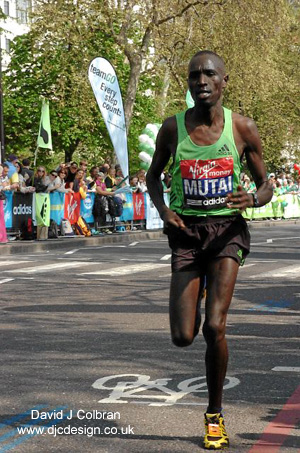 Emmanuel Mutai made it a Kenyan double after winning the Virgin London Marathon in a new course record. Mutai's time of 2:04.38, beats the previous best of 2:05.10 set by Samuel Wanjiru in 2009 and also the fifth-fastest time ever.
Emmanuel Mutai made it a Kenyan double after winning the Virgin London Marathon in a new course record. Mutai's time of 2:04.38, beats the previous best of 2:05.10 set by Samuel Wanjiru in 2009 and also the fifth-fastest time ever.I'll take it that's a "no", then.
Elite marathon runners have optimised their metabolisms to use the minimum possible amount of muscle glycogen as fuel. Muscle glycogen storage is limited to ~1,680kcals-worth (~420g of carb)*.
Supercompensation (depletion followed by 3 days of carb-loading) can increase this figure to ~720g*.
Fat storage can amount to ~35,000kcals-worth (~10lb of fat), even in a skinny Kenyan like Mutai.
A blogger called Thor Falk took the data from It's all in a day's work (as measured in Joules) and plotted it as a graph in Fat vs carb burning – a N=1 chart. Here's the graph:-
 Even a super-fit Kenyan like Mutai burns some carbs when running at ~12.5 miles per hour. The less fit that somebody is, the more the first corner in the blue plot moves down and to the left. This results in more carbs being burned at energy consumption levels more than the first corner. This depletes muscle glycogen stores faster, resulting in "hitting the wall" (running out of muscle glycogen) sooner.
Even a super-fit Kenyan like Mutai burns some carbs when running at ~12.5 miles per hour. The less fit that somebody is, the more the first corner in the blue plot moves down and to the left. This results in more carbs being burned at energy consumption levels more than the first corner. This depletes muscle glycogen stores faster, resulting in "hitting the wall" (running out of muscle glycogen) sooner.Muscles that are depleted of glycogen are more insulin-sensitive than muscles that have more glycogen, therefore the less aerobically-fit somebody is, the sooner their muscles become insulin-sensitive when they exercise.
*Assuming 20kg of muscle (Lore of Running P104)
No comments:
Post a Comment